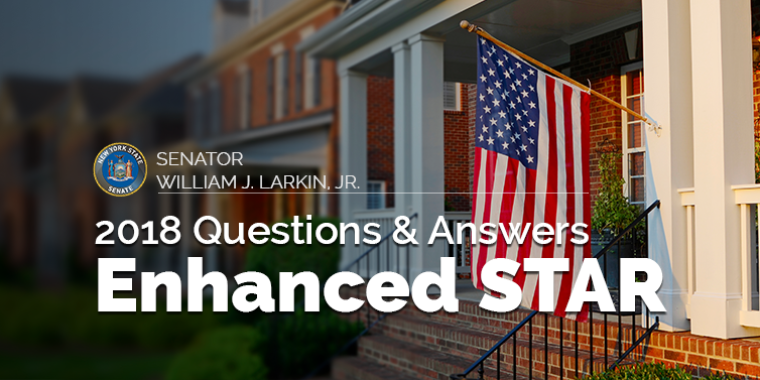
2018 Question and Answers About Enhanced STAR
November 30, 2017

What is Enhanced STAR?
Enhanced STAR is a school property tax benefit that saves most senior homeowners in New York State hundreds of dollars each year.
Who is eligible for Enhanced STAR?
Enhanced STAR is available to senior citizens (age 65 and older) who own and live in their primary residence, and who meet certain income requirements (see below). To be eligible for Enhanced STAR, all homeowners must be 65 or older unless the home is owned by spouses or siblings – in which case only one owner must be 65 or older. * Note, if you turn 65 at some point in 2018, you meet the age requirement.
What are the income requirements for Enhanced STAR and how is income defined?
To be eligible for Enhanced STAR, you must have earned no more than $86,000 in the 2016 tax year. Eligibility is based on the combined incomes of all the owners and any owner’s spouse who resides at the property. Even if you exceed this limit, you are most likely still eligible for Basic STAR. Income is defined as federal adjusted gross income (as reported on federal or state income tax returns) minus the taxable amount of total distributions from IRAs.
I understand there were changes made to the STAR program (Basic and Enhanced), now there is a STAR exemption and a STAR credit. What’s the difference?
The STAR exemption (Basic and Enhanced) is the “old” STAR program. The STAR exemption appears directly on your school tax bill, and your STAR savings are deducted directly from your school taxes. If you received a STAR exemption on your school tax bill in 2015 and have not moved, then you are most likely a “STAR exemption” recipient/applicant. Most longtime homeowners receive the STAR exemption.
The STAR credit (Basic and Enhanced) is the “new” STAR program. Under the STAR credit program, there is no exemption on your tax bill, and your STAR savings come via a check from the state Tax Department around the time you get your school tax bill. “STAR credit” recipients/applicants are individuals who recently purchased a home, recently moved, and who have never applied for STAR in the past.
Important note: Homeowners who have had Basic STAR on their property for many years and are applying for Enhanced STAR for the first time (at the same property), are still considered Enhanced STAR exemption applicants.
How do I apply for Enhanced STAR?
Enhanced STAR exemption applicants must submit form RP-425-E (Enhanced STAR application) or form RP-425-Rnw (Enhanced STAR renewal application) with their local assessor and show their income was no more than $86,000 in the 2016 tax year (you must provide a copy of your income tax return). If you did not file a federal or state tax return for 2016, contact your assessor to find out what information is needed to satisfy the income requirement. Applications are available at your assessor’s office or on the Tax Department’s website at www.tax.ny.gov.
Enhanced STAR credit applicants have to register for STAR with the NYS Tax Department rather than applying with their local assessor. When you register, the Tax Department automatically reviews whether you are eligible for Basic or Enhanced STAR. Visit the Tax Department’s website at www.tax.ny.gov to register.
Is there a deadline to apply/register for Enhanced STAR?
Enhanced STAR exemption applicants must apply on or before March 1, 2018, to receive STAR benefits in the fall of 2018.
Enhanced STAR credit applicants should register as soon as possible after moving into their homes. Generally, you need to register by July 1 to receive your STAR credit check by the time school taxes are due. If you register after this date, you will still receive a check, but it will likely be at a later date.
Do I have to reapply each year for Enhanced STAR?
Enhanced STAR exemption recipients need to reapply every year unless they participate in the optional Income Verification Program, which authorizes the NYS Tax Department to verify their income eligibility each year. To participate in the Income Verification Program, file form RP-425-IVP along with your Enhanced STAR application (RP-425-E or RP-425-Rnw) and a copy of your 2016 income tax return with your assessor.
Enhanced STAR credit recipients who have already registered for STAR with the NYS Tax Department do not need to reapply every year. Once you have registered, the Tax Department will automatically review your eligibility for Enhanced STAR every year after that for as long as you continue to own and occupy that home.
How will I know how much I am saving on my taxes?
- Enhanced STAR exemption recipients will see their STAR savings directly on their school tax bill.
- Enhanced STAR credit recipients will see their savings in their STAR credit check.
- The dollar value of the credit and the on-bill exemption will generally be the same.
Does Enhanced STAR apply to all taxes on my property?
No. Enhanced STAR applies only to school district taxes.
What types of properties are eligible for Enhanced STAR?
Enhanced STAR is available for owner-occupied residences, including: houses, condominiums, cooperative apartments, mobile homes and farm houses. Enhanced STAR is also available for mixed use properties, including apartment buildings, but only applies to the owner-occupied portion of such properties.
Is Enhanced STAR available on my vacation, other home(s)?
No. Enhanced STAR is only available on your primary residence.
Can a surviving spouse who is not 65 years old continue to receive Enhanced STAR?
Yes, if she or he is at least 62 years old on December 31, 2018, and all other requirements are met.
What about nursing home residents?
If you own your home, you are eligible for Enhanced STAR, as long as no one other than the co-owner or spouse resides there.
How does Enhanced STAR work with respect to trusts and life estates?
If you are a trust beneficiary who conveyed your home to trustees but continues to live in the home, you get the Enhanced STAR benefit. For example, a senior creates a trust and conveys her home to her children as trustees. If she remains in the home as the beneficiary of the trust, she is considered the homeowner and gets the Enhanced STAR benefit.
Under a life estate, one party has a “life tenancy” (ownership for the rest of his or her life) and another party will become the owner after the life tenant dies. For STAR purposes, the life tenant is deemed to own the property; so Enhanced STAR eligibility is based on the life tenant’s qualifications.
Blooming Grove: 845-496-5223 ext.5
Chester: 845-469-7000 ext.6
Cornwall: 845-534-7290
Crawford: 845-744-3721
Highlands: 845-446-4280 ext.315
Monroe: 845-783-1900 ext.206
Montgomery: 845-457-2650
Newburgh (City): 845-569-7333
Newburgh (Town): 845-564-4550
New Windsor: 845-563-4631
Woodbury: 845-928-2439 ext.4
Haverstraw: 845-942-3717
Stony Point: 845-786-2716 ext.117
Marlborough: 845-795-6167 ext.8
Plattekill: 845-883-7331 ext.17
